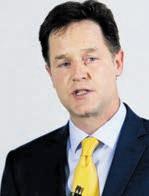SOLE MATES JIMMY CHOO ON WHY HE OWES HIS CAREER TO THE CITY OF LONDON P16



THE CBI survived a no-confidence vote on its future yesterday after members voted in favour of the scandal-hit lobbying organisation’s transformation plan –but government sources suggested the victory wouldn’t see the lobbying organisation invited back into Downing Street anytime soon.
The vote of 93 per cent in favour to seven per cent against from the group’s membership came as a major boost to the six-decades old business body, which has battled weeks of scandal.
Since lurid allegations of sexual misconduct and abuse were reported in newspapers, the body has introduced a new people and culture committee and begun work on a leadership shake-up.
Members were asked whether

“the changes we have made − and the commitments we have set out − to reform our governance, culture, and purpose give you the confidence you need to support the CBI?”
Rain Newton-Smith (pictured), the long-time CBI economist and new director general, said she was “deeply grateful for the faith shown in us by our members.”

Though the margin of victory was significant, government sources noted the number of votes –a total of 371 cast by individual corporate members and trade associations –contrasted heavily with the 190,000 businesses the CBI claims to represent.
The government has frozen engagement with the body since the claims emerged –a stance mirrored by the Labour party –representing an existential threat to an organisation which relies on its
access to senior decision-makers in its pitch to members.
One senior Tory source told City A.M.: “Not to rain on their parade, but I’m not convinced that a secret ballot of 0.2 per cent of the businesses the CBI claims to represent is going to mean the government or political parties opening their arms and saying all is forgiven.”
Those members who had already terminated their membership, such as Aviva and Phoenix, were not entitled to a vote.
A government spokesperson said: “We will continue to engage with businesses on a case-by-case basis and business groups where appropriate.
“The CBI is responsible for rebuilding the trust and confidence of their membership,” the spokesperson added.
Despite the victory, a headcount reduction is expected due to the pull-out of a number of high-fee-paying corporate members.
 FRANK DALLERES
FRANK DALLERES
THE PGA Tour, DP World Tour and LIV Golf announced a shock merger yesterday to end the long-running conflict involving the sport’s three biggest men’s professional circuits. It will see the tours continue as separate competitions but combine their rights under one new entity and end long-running legal action between the challenger LIV Golf and the two legacy circuits.

All parties said details were still to be finalised, but the deal would see Saudi Arabia’s Public Investment Fund,
which has bankrolled LIV Golf, become the sole new investor.
PIF governor Yasir Al-Rumayyan said the investment could total billions of dollars, while PGA Tour commissioner Jay Monahan called it “a historical day for the PGA Tour and the game of golf. And it’s a historical day for the PIF and the DP World Tour.
“There’s been a lot of tension in our sport over the last couple of years. But what we’re talking about today is coming together to unify the game of golf.”
£ SPORT: 19-20
NICHOLAS EARL
ENERGY giant Shell last night hit back at the UK’s advertising watchdog, after the body found it guilty of greenwashing.
The Advertising Standards Authority (ASA) upheld a complaint that two Shell adverts, which
emphasised the company’s renewable credentials, were likely to “mislead consumers [by misrepresenting] the contribution that lower-carbon initiatives played, or would play in the near future, as part of the overall balance of a company’s activities”.
Shell disagreed with the decision,
arguing their advertising campaign was essential for drawing awareness to their growing green agenda.
A spokesperson for Shell said: “People are already well aware that Shell produces the oil and gas they depend on today. When customers fill up at our petrol stations across the UK, it’s under the instantly-
recognisable Shell logo.”
Shell has warned the ASA it would be disproportionate and unworkable for regulators to require businesses with diverse product portfolios to ensure that ads, whose primary purpose was usually to promote a specific range of products, always provided a full
overview of the advertiser’s business as a whole.
It is not the first time the ASA has hit out at a corporate giant over green claims, having banned two ads created by HSBC touting its environmental contribution despite it “continuing to significantly finance” non-green projects.
BODY WINS CRISIS VOTE BUT QUESTIONS REMAIN OVER LOBBY GROUP’S ACCESS TO MINISTERS
TO THE fairway, then, for the latest example of markets working effectively.
The merger of the three biggest tours in the game shows what can be achieved when new entrants disrupt a market –forcing the established players to (excuse the pun) up their game.
When LIV Golf –the Saudibacked, all-singing, all-dancing new form of the game –launched, sceptics lined up to
predict its impending failure. It would never attract the players, they said. It did. It would never receive the coverage of the established tours, they said. It did. Even when protectionist barriers were placed in the way, with bans on competing in the
Ryder Cup and other flagship events, LIV kept finding a way to put on a high-end product. Competition did wonders for the workers –the golfers, in this case by significantly increasing the cash prizes on offer. Now, with LIV golfers back on PGA greens, it works for consumers too, who will benefit from the innovations that the disruptor has come up with in both format and digital delivery.
In short, the competition
between the young guns and the old establishment has produced a better game, and a better commercial product. Rather than fighting LIV in the courts, the PGA has decided to team up: investment from the backers of LIV and golf expertise from people who’ve been running tournaments for decades.
Around the time LIV launched, we published a piece which suggested that the entrance of a disruptor to a monopoly market


was one of the few areas where Karl Marx and Adam Smith might find common ground. Marxists would welcome the increased rewards for labour going to the golfers, while Smithian free marketeers would predict a better product as a result. We’ve got both. And the best news of all is that at some point another new disruptor might come along and do the same again. Here’s to competition, in business and on the green.
The owner of the Telegraph Media Group has been threatened with receivership by lender Lloyds Banking Group over a longstanding debt owed by the parent company controlled by the Barclay family.
THE TELEGRAPH WORST MONTH EVER FOR ESG FUNDS AS BRITISH INVESTORS PULL £300M ESG funds have suffered their worst month for withdrawals on record as market turmoil and rising inflation prompt investors to focus on returns ahead of ethics.
BLOOMBERG
UK SHOPPERS SEE MORE SHRINKFLATION IN AISLES
British shoppers are becoming more aware of “shrinkflation,” as food producers cut packet sizes while charging the same or more than they used to, as 83 per cent say they are concerned the trend is growing
CITY A.M. REPORTER
THOUSANDS of Ukrainian citizens were forced to flee their homes yesterday after a Soviet-era dam collapsed in the south of the country, with Ukraine blaming Russia for what one adviser to the country’s president called “a war crime”.
The Kakhovka dam, upstream from Kherson, fell away overnight with a resulting torrent of water flowing downriver, flooding a number of villages and threatening the city of Kherson.
Neither side was able to present concrete evidence of who was responsible,
with Russian authorities eventually blaming Ukrainian shelling.
President Zelenskyy said Russia’s ‘terrorists’ had blown up the dam.
The UN said the dam’s collapse was a result of the Russian invasion, with one theory circulating on social media suggesting the Russians had failed to properly maintain the dam since seizing it last year.
The dam supplies water to much of Crimea, a vital agricultural hub, and also to the cooling tanks of Europe’s largest nuclear power plant.
Ukraine’s nuclear agency said there was a danger to the plant if water lev-
els fell precipitously as water escaped the reservoir next to the dam –though the International Atomic Energy Agency said there was no immediate threat.
The sudden flooding of the region comes just as Ukrainian forces were said to be beginning a long-awaited counter offensive across eastern and southern Ukraine.
NATO chief Jens Stoltenberg came closest to pinning the blame on Russia, describing the dam collapse as “an outrageous act which once again demonstrates the brutality of Russia’s war in Ukraine”.

CHRIS DORRELL
CHALLENGER banks are increasingly on the lookout for acquisition opportunities as rising interest rates reveal takeover opportunities in the sector.
Nigel Terrington, chief executive of Paragon Bank, told City A.M. that they “continue to look for opportunities” having made four acquisitions in seven years.
Terrington noted that “in environments like this, some lenders are not as strong as we are… We are looking for M&A opportunities to supplement our strong organic growth”.
Digital challenger bank Cashplus is also looking for takeover targets.
Rich Wagner, chief executive of Cashplus told City A.M. there’s been “a definite shift over the last 18 months, with some of the extremely high valuations previously seen in the market taking a serious reality check.”
Wagner said the next phase will likely see “some form of consolidation in the
market”. In particular Wagner highlighted “non-banks that are now struggling with higher funding costs” as likely takeover targets.
While rising interest rates have been a boon for many UK lenders, it has also acted as a reality check for some of the smaller players in the market.

Higher rates have increased the funding costs for all banks, but particularly non-banks who do not take deposits. Deposits are the cheapest form of funding available to banks.
Many in the industry now expect that there will be a slew of M&A activity over the coming months as the industry adapts to an environment with higher interest rates.
“Smaller banks need to find a way to scale their platforms” in an environment with rising costs and lower lending volume,” Ravi Anand, managing director of non-bank lender Thincats .
“With IPO markets shut and investors wishing to enhance their value, consolidation is likely.”
Lenders have come under increasing scrutiny from MPs for failing to pass on rate rises to savers while charging more for mortgages
CHRIS DORRELL
MORTGAGE rates have skyrocketed in recent weeks after the UK’s most recent inflation reading sent rate expectations soaring, but savings rates have lagged behind.
According to data from Moneyfacts, rates on a two-year fixed rate have jumped from 5.34 per cent on 24 May to 5.75 per cent yesterday. Similarly, interest rates on a five-year fixed rate have risen from 5.01 per cent to 5.44 per cent in the same period.
THE COSTS of sustainable aviation fuels (SAF) will remain up to four times higher than jet fuel until 2050, according to new analysis.
Bain and Co found SAF prices in 2050 will remain two to four times higher than the average historical price of Jet A fuel, the most commonly
used aviation fuel. The sector would also need to invest up to $2.1trn (£1.69trn) to produce enough to hit 2050’s net zero targets. This, plus the high maintenance costs of new aircraft, would mean airlines’ costs rising by 18 per cent.
Airlines have touted SAF as an essential component of net zero. However, there have been growing
fears in the sector over the cost and supply of climate-friendly biofuels.

Bain and Co found total SAF supply would be 35 per cent of the projected demand for global jet fuel by 2050. The report calls for more government incentives and a strategy to “secure an affordable supply” of the biofuel SAF, to raise production to 60 per cent of demand.
Rates increased dramatically after a higher than expected inflation reading on 24 May raised concerns that the Bank of England would have to keep hiking, potentially raising rates to as much as 5.5 per cent. The base rate is currently 4.5 per cent. The data shows how savings rates offered to consumers often lag behind the rate charged on mortgages. Lenders have come under pressure from regulators and lawmakers for failing to pass on rate rises to savers

while charging more for mortgages. An influential group of MPs has described the rates on offer at many banks as “measly”.
At the same time, many banks have reported bumper profits in the last few months as a result of higher interest rates, raising concerns that they are profiteering off higher rates. The banks argue that mortgage rates are not directly connected to interest rates, and are instead tied to swap rates, the expectation for what interest rates will be in 10 years time.
MERGERS and acquisitions in the UK tumbled sharply in the first three months of the year as recessionary fears and rapid rate hikes spooked dealmakers, official figures have revealed yesterday.

The worst fears of a raid on UK firms failed to materialise as foreign firms spent £12.7bn snapping up British business between January and March, £4.1bn less than the same period last year, the Office for
National Statistics (ONS) found.
The deal figures did mark a £6.9bn uptick on the deal value between October and December, however, when the value of M&A activity dipped amid the volatility triggered by Liz Truss’s disastrous mini budget. The volume of deals done fell sharply on the same period last year, according to ONS data. There were 141 transactions in January, 100 in February and 114 in March, whereas there were more than 150 transactions in each month
 JACK BARNETT
JACK BARNETT
POUND STERLING could end 2023 at its highest level in more than a year, strengthened by the Bank of England continuing to hike interest rates and the Federal Reserve taking its foot off the brake, analysts told City A.M.


The UK’s currency may strengthen to $1.30 toward the end of this year, driven by traders piling into UK assets to capitalise on higher returns.
Bank of England economists are tipped by financial markets to send interest rates to at least 5.25 per cent, which would set the UK’s official borrowing rate apart from the US's and Europe’s.
Fed chair Jerome Powell is expected to lead the central bank into pausing its tightening cycle at its meeting next week and potentially begin cutting borrowing costs from a range of five per cent and 5.25 per cent later this year.
Inflation has eased to its lowest level in a year in the US to 4.9 per cent, ushering in the start of the traders fleeing the dollar to hunt out profits in other assets. European inflation has fallen to 6.1 per cent, raising expectations of just one more rate rise to 3.5 per cent from the European Central Bank.
A “multi-year [US dollar] bear trend from 3Q onwards once US activity and particularly US price data starts to decisively turn lower” is on the way, Chris Turner, global head of markets and regional head of research for UK and CEE at ING, told City A.M.
“We think GBP/USD could grind up towards the $1.30 area by year-end purely on the dollar story,” he added, which would take the pound to its highest level against the greenback since April 2022.

So far in 2023, sterling has risen more than two per cent against the dollar to just over $1.23, making it one of the advanced world’s top performing currencies. The euro is down marginally against the dollar this year. However, in the background, debt rates have been spiralling as inflation proves much harder to tackle than expected.
Core inflation rose to 6.8 per cent in April and the headline CPI rate fell slower than projected to 8.7 per cent.
That has prompted traders to bet Bank governor Andrew Bailey and co will keep hiking rates, helping the pound, though analysts warned such a move by the central bank could actually hurt sterling.
throughout 2022.
Dealmakers have been unsettled by wild market swings sparked by the wake of war in Ukraine, while rapid interest rate hikes by the Bank of England to tame soaring inflation have made debt financing deals for firms more expensive.
Rob Baxter, head of corporate finance at KPMG in the UK, said that “confidence is king” and volatile economic conditions had unsettled investors, but added that “deals are still getting done”.
CHRIS DORRELL
SHARES in Paragon Bank surged nearly eight per cent yesterday morning after the FTSE 250 lender reported record interim profits and significant deposit inflows.
In the first half of the year, Paragon’s underlying profit jumped 22 per cent to £128.9m as the bank benefitted from rising interest rates.
The bank's net interest margin (NIM), the difference between what it pays out and receives in interest payments, widened to 2.95 per cent. This helped its net interest income to jump to £212.4m from £175.2m last year.
Paragon upgraded its full year NIM guidance to around 3.0 per cent, signalling further gains to come.
The pound is caught in a bit of a bind at the moment. Bank of England officials are poised to jack up interest rates to at least 5.25 per cent, financial markets reckon. That could mean the Bank surpasses the Federal Reserve in its tightening cycle. It’ll certainly take it much further ahead of the European Central Bank. Such a move would normally support sterling by making it more attractive to buy UK assets.
But, if the Bank goes too hard and
fashions an unnecessary recession, traders may not want anything to do with the currency.
Raising rates aggressively while its peers are pausing is an implicit admission by the Bank that the UK is suffering a stickier inflation problem – also not good news for the pound.
JACK BARNETTNew mortgage lending in the period was 19 per cent higher than the first half of last year. Paragon specialises in loans to professional landlords. It upgraded its guidance for full year mortgage lending to between £1.75bn and £1.9bn. Paragon raised its interim dividend by 17 per cent and also announced an additional £50m buyback.
Chief executive Nigel Terrington told City A.M. he was “really pleased with the results”.
The bank's deposit base grew by £11.9bn with the lender saying there was "no disruption to deposit gathering from the events in the US".
JESSICA FRANK-KEYES
THE PRESIDENT of Microsoft has called for a licensing regime for artificial intelligence (AI) firms, arguing that such a system would be needed to ensure AI models are used safely.

“There are some categorys of models that are so powerful, so impactful, there will need to be
certain regulations and laws –new regulations and laws –that will apply to them,” Brad Smith said, speaking at a Tech UK conference yesterday.
Smith said: “I think it probably means that before a model can be deployed it will have to pass some kind of safety review.
“And just like an aeroplane, a bus, and an automobile, a powerful model will probably need to pass such a
review, and in our view it probably should get a licence.”
“Of course that means there will need to be a licensor in a position to make that decision,” he added.
Smith also met with British finance minister Jeremy Hunt yesterday as he said he would look to work with regulators to seek UK approval for its $69bn purchase of ‘Call of Duty’ maker Activision Blizzard.
THE US’s financial watchdog continued its crackdown on the crypto industry yesterday, suing the exchange and broker Coinbase in a Manhattan court.
The Securities and Exchange Commission (SEC) said that the crypto giant was operating as an unlicensed broker in the US, as well as operating a ‘staking tool’ which effectively served as an unregulated security.
The move came just a day after the SEC also brought forward legal action against fellow crypto behemoth Binance.

Coinbase hit back at the SEC, whose boss Gary Gensler described the crypto market as a “Wild West” of investing.
“The SEC’s reliance on an enforcement-only approach in the absence of clear rules for the digital asset industry is hurting America's economic competitiveness and companies like Coinbase that have a demonstrated commitment to compliance,” said Paul Grewal, Coinbase’s general counsel.
The moves against Coinbase and Binance reflect the confused nature of



VENTURE capital behemoth Sequoia Capital has revealed plans to carve up its business into three distinct firms due to the “increasingly complex” pressures on its operations across the US, China and India.





split the firm’s US, China and India businesses to “become distinct firms with separate brands” by the end of March next year.


complex to run a decentralised global investment business,” Sequoia’s three founders said in the letter.
crypto regulation across the globe, with legal action and case-by-case enforcement rather than sweeping, industrywide rules.
Coinbase shares sank by almost 14 per cent on the open.
Amongst the SEC’s complaints is a staking programme which pools crypto assets before dishing out ‘rewards’ to customers after taking a commission.
The SEC said Coinbase would have been “fully aware” that this represented a security, but ignored it.
“Coinbase’s alleged failures deprive investors of critical protections, including rulebooks that prevent fraud and manipulation, proper disclosure, safeguards against conflicts of interest, and routine inspection by the SEC,” Gensler tweeted.
The SEC has also launched action against a crypto-powered platform run by the Winklevoss twins, Gemini.
At the time Gensler said the case should make clear “to the marketplace and the investing public that crypto lending platforms and other intermediaries need to comply with our timetested securities laws.”
In a letter to investors yesterday, Sequoia chiefs said they would
 JACK BARNETT
JACK BARNETT

HOUSEBUILDING has tumbled to its lowest level in three years in another blow to the homeownership dreams of millions of Brits, a closely watched survey out yesterday revealed.
According to S&P Global and the Chartered Institute of Procurement and Supply’s (CIPS) latest construction purchasing managers’ index (PMI), the rate of new houses being rolled out across the UK has slumped to its

weakest pace since May 2020.
While house prices have receded around four per cent from their record highs of last summer, they are still far above their pre-pandemic level, making it tougher for first time buyers to achieve their homeownership ambitions.
The fall in supply will potentially keep house prices higher than many analysts expect, with demand usually negatively affected by the kind of interest rate-rise cycle seen recently.
The China division will adopt the name HongShan while the firm’s Indian arm will become Peak XV Partners. The US and European operations will retain the Sequoia Capital name.
“It has become increasingly



“As each entity’s portfolio has expanded to include companies that are becoming global leaders, we’ve seen growing market confusion due to the shared Sequoia brand as well as portfolio conflicts across entities,” they said.



POUNDLAND owner Pepco has plans to roll out 550 more sites this year across the UK and Europe as its cheap and cheerful goods continue to perform well with customers amidst the cost of living crisis.
In its interim results, the value shop, which sells everything from groceries to clothes, posted a 22.8 per cent jump in revenues of €2.83bn (£2.44bn) up from €2.37bn (£2.04bn) in the six months to March.
As food inflation reached its second-highest levels on record during the quarter, Poundland reported an increased demand in its value chilled and frozen ranges, as shoppers looked to stock up and cut back on waste.
The brand, which has 756 stores across the UK, did however report a 5.7 per cent drop in profit before tax of €134m (£115m), which it said reflected investment in new stores, supply chain costs and inflation.
The 50 new stores across the UK,
THE OWNER of Simply Be and Jacamo has told investors that it expects the hangover of high inflation and low consumer confidence to continue to impact the business next year, with the retailer posting a more than 80 per cent reduction in profitability.
N Brown, which trades solely online posted a 5.3 per cent decline in revenues for the year down to £677.5m compared to £715.7m in the same period last year, as a tough trading environment impacted its cost base.
The group said it wants to improve its bottom line, moving further into clothing, and has launched a new online mobile app for Simply Be. However, it warned that it expects further increases in adjusted operating costs to group revenue ratio in FY24, due to inflationary pressures –particularly in administration and payroll costs.
 Steve Johnson, chief executive
Steve Johnson, chief executive
said: “We continued to make strategic progress despite these challenges, increasing investment during the year, and we successfully launched our new mobile-first website for Simply Be.
“We are expecting the weaker consumer confidence to continue weighing on our performance before we see a return to growth and are therefore keeping a tight control of costs,” he added.
The fast fashion industry at large has been in the spotlight since the end of the pandemic, with a more significant return to in-person retail than many analysts expected during the workfrom-home driven boom.
Earlier this week Asos, which has been forced into a significant transformation programme to reduce costs, received a long-overdue boost after reports it had been in discussions with an overseas buyer about a potential takeover last
Other online-focused retailers including THG have similarly had a tough time on the stock market since the end of lockdown restrictions.
will create up to 800 new jobs, according to reports in The Sun.

“As we highlighted previously, inflation remains at elevated levels in central Europe, against which trading in Pepco stores has remained challenging during the third quarter to date,” Trevor Masters, chief executive of Pepco Group, said.
“Despite this, we have continued to do the right thing for customers on a budget by maintaining our price leadership and growing our market share.”
CIGARETTES giant British American Tobacco (BAT) said yesterday it expected a three to five per cent uplift in revenues thanks to continued investment in so-called alternative products. Shares jumped in early trading and settled up more than one per cent at the close.

During the quarter the group welcomed 900,000 new customers via sales of alternatives such as vapes.
However, sales in its combustible products, such as traditional cigarettes, fell off in its US market, as smoking continues to prove unfavourable with consumers.
BAT said it is on track to deliver £5bn of revenue in the next two years, but revenue growth would be
impacted by its decision to transfer its Russian and Belarussian businesses.
“We are making good progress towards de-leveraging our balance sheet, supporting our ambition to... return excess cash to shareholders,” said boss Tadeu Marroco.
There was no change to guidance and Panmure Gordon analyst Rae Maile said BAT’s update went down well with markets.
THE
Investors lay all their love on tech provider to Abba Voyage after results reveal money, money, moneySHARES in Oxford Metric, which makes ‘smart-sensing software’ used in video games, and powers much of the technological wizardry of the Abba Voyage show in east London, shot up by almost 10 per cent yesterday after it reported its strongest ever firsthalf trading performance. Boss Nick Bolton said the firm was “on a mission” in year two of a five-year plan. LAURA MCGUIRE Value retailers continue to benefit from a tougher economic climate Simply Be and Jacamo are ‘size inclusive’ retailers
ENERGY giant SSE is to pay a £9.8m penalty after breaching its generation licence, the UK’s energy regulator has announced.
Ofgem said a detailed investigation found the FTSE 100 company’s generation arm overcharged the National Grid Electricity System Operator (NGESO) during a time of so-called transmission constraint.
Transmission constraints happen in a variety of situations such as when there is not enough electricity network capacity to transport power out of an area in which local generation outstrips demand.
The electricity system operator takes action to manage flows across the network to increase and decrease the amount of electricity produced by different generators
But given the system only has limited alternatives available to it in these situations, there are risks that generators
could exploit their position by increasing prices to reduce output. Ofgem puts rules in place to prevent this.
Ofgem said that while there was no evidence to suggest the actions were deliberate, it found that SSE breached the rules in place. It warned that the pricing actions would ultimately increase costs for consumers.
“This enforcement action sends another strong signal to all generators that they must put in place controls to ensure that their bid prices are set in a way that ensures that they do not obtain excessive benefits during transmission constraint periods,” Cathryn Scott, director of enforcement and emerging issues at Ofgem, said. “If they fail to do so, they will face significant consequences.”
An SSE spokesperson said: “We aim to comply with regulations at all times and believed we were doing so in this case.

“We are updating our relevant procedures accordingly.”
NICHOLAS EARL
SOME $30bn (£24.2bn) of investment in new UK energy projects is at risk if Labour wins the next election, a top energy consultancy has warned. Consultants at Wood Mackenzie believe the growing expectation of a future Labour government –which has pledged to ban new North Sea oil and gas developments –has already been causing energy firms to pivot from the UK.
The Conservative government’s
NICHOLAS EARL
OIL PRICES have failed to take off following OPEC’s decision to sustain heavy output cuts and Saudi Arabia’s call to unilaterally slash production by a further million barrels per day.
Both major benchmarks have effectively flatlined in this evening’s trading session, with Brent Crude down 0.16 per cent at $76.59 per barrel
and WTI Crude sliding 0.04 per cent to $72.12 per barrel – firmly below Saudi Arabia’s prized break-even point of $80.
This follows Brent Crude gaining $2.60 per barrel and WTI $3.30 per barrel respectively in yesterday’s trading, after Saudi Arabia confirmed its production levels would lower from 10m barrels per day to nine million.
However, sluggish growth in China
and potential recessions in the US and Europe have effectively offset Saudi Arabia’s latest cuts, weighing down expectations for demand.
Callum Macpherson, head of commodities at Investec said: “The question for the market is whether Saudi Arabia, by itself, has the capacity and willingness to manage the market. Clearly there is a fear that it does not.”
windfall tax has already angered many oil and gas firms, with several currently reconsidering their pipeline of UK projects.

But it added that a Labour government also risks sending a message to investors that the UK is not secure for new energy projects more broadly, deterring future investment in renewable energy developments amid an increasingly poor financial climate.
“The prospect of a new Labour government –which plans to
introduce a 'proper windfall tax' –is a major headwind to [final investment decisions],” the consultancy said.
It fears that "fiscal and political uncertainty is causing investor paralysis and could prematurely shut down the industry”.
“While some robust projects will still go ahead, investment – already at historical lows – could fall below $1bn per year by 2027.”
Labour was contacted for comment.
TICKETS FROM £49


KEIR Starmer has suggested that, under a Labour government, the awarding of state contracts could hinge on how companies treat trade unions that represent their staff. Speaking at the annual congress of trade union GMB in Brighton yesterday, Starmer said that Amazon should “recognise unions”, arguing that his party would beef up the power of trade unions if it was elected into government.
When he was asked what a Labour government would do if Amazon –which earned £222m from the government and public sector contracts last year –refused to recognise the workers’ union, he replied: “There’s lots of public money tied up in procurement, and an incoming Labour government is entitled to ask ‘what are the terms and conditions?’
“There’s a framework for public procurement, at the heart of which is dignity and respect, and we expect
LAWYERS have warned of a looming clash between the Financial Conduct Authority (FCA) and the legal profession after the watchdog’s new enforcement chief fired barbs at the sector’s conduct when defending firms.
In a speech last week, the FCA’s new joint executive director of enforcement and market oversight, Therese Chambers told City lawyers that while they “like to see themselves as risk managers”, those defending firms should “ask themselves what poses the greatest risk in the long term”.
Chambers, a former private practice lawyer, warned legal professionals “you can use your skills to block an inquiry, to claim privilege for every piece of paper and generally get in our way, but what is that going to achieve?”
The comments have triggered warnings of a new hard-headed approach from the FCA towards lawyers defending City firms that are being investigated by the regulator.
“The pointed reference to defence lawyers using ‘aggressive diversionary tactics to prolong the timeline of FCA enforcement investigations’, may shape future engagement between
FCA enforcement and lawyers defending firms and senior executives under investigation,” Richard Burger, a partner in the UK investigations practice at law firm Wilmerhale, told City A.M.
“When the co-director of FCA enforcement refers to getting your ducks in a row now, the message is clear that more enforcement action will follow,” Burger added.
Matthew Nunan, partner at Gibson Dunn and a former senior official at the FCA, told City A.M. that Chambers’ warnings “feel like a very clear warning for regulated firms” and they would “have to think carefully about whether they genuinely want to cooperate with investigations or not”.
“There is also a real marker put down to firms about the conduct of their advisers – the FCA will be wary of firms that say they wish to cooperate but then hide behind obstructive lawyers,” Nunan added.
“Advisers must, however, continue to give robust advice and cannot be afraid to challenge the regulator,” he said.
“Case law shows the regulator is not always right and rolling over to demonstrate cooperation isn’t always the best long-term approach,” he added.
to see unionised jobs, and support unionised industries,” the Guardian reported.
An Amazon spokesman said: “Amazon respects our employees’ rights to join, or not to join, a union.”

Starmer’s comments come as he looks to improve his relationship with the union, after GMB boss Gary Smith criticised the party’s plans to scrap new oil and gas licences in the North Sea, branding the idea “naive”.

GUY TAYLOR
THE UK’s space sector contributed £7bn to the UK economy last year, new data has revealed.
Kevin Craven, chief executive of aerospace and defence trade organisation ADS Group, which published the data, said that the UK continues to be a “world leader” in space, but that “innovation and expertise must be fully utilised and leveraged to secure UK advantage".
The figure shows that the UK’s space industry is still going strong after it was hit by the botched Cornwall launch of British billionaire Richard Branson’s Virgin Orbit in January.
The California-based company subsequently paused operations and placed some staff on furlough in early March, before eventually filing for bankruptcy in April.
Will Lecky, co-founder and director of know.space, a space economics and strategy consultancy, told City A.M: “While the Virgin Orbit launch was a setback, it is not the only game in town. We view that we are still in the relatively early days of a longterm growth story.”
“The UK can’t be complacent in what is a competitive global landscape, though it is well positioned to take advantage of new opportunities as we progress towards a $1trn global space market,” Lecky said.
GUY TAYLOR
THE UK’s electric vehicle sector is hoping for some good news from the two-day meeting between Prime Minister Rishi Sunak and US president Joe Biden, who are set to announce closer economic ties between the two nations this week.

Biden is expected to offer new
trading arrangements to help the UK’s struggling EV division compete with US manufacturers, in the form of a critical minerals agreement, according to reports.
The meeting comes after the UK’s nascent EV industry raised concerns about Biden’s Inflation Reduction Act, which is currently offering hundreds of billions of dollars in subsidies for
EVs produced in America.
The visit comes at a pivotal moment for Britain’s electric industry, with an announcement confirming that a new multi-billion pound Jaguar Land Rover gigafactory –which has been touted as essential for the UK to stay competitive in the EV race –will be located in Somerset rather than Spain, also expected this week.
Last week, almost every front page of our national newspapers quoted the ‘AI pioneers’ warning us that AI advancements may lead to our own extinction – akin, they said, to nuclear weapons or another pandemic. Of course, whenever an expert of this status takes to the floor, we must listen. But, at the same time, won’t the ‘existential risk’ of AI depend largely on how we apply it?

Although we should certainly monitor the usage of artificial intelligence, we should also be embracing the potential of this technology to truly reap its benefits. As we have already discovered, AI can improve our lives in innumerable ways –from optimising work, accelerating cures for illnesses, driving progress towards a carbonfree world, enhancing education, powering economic growth, and helping emerging nations to rapidly industrialise.
Creating the conditions for AI to evolve safely will be crucial to this progress. But most importantly, we need to train people –especially our young people –how to use the technology properly. As many of our children prepare for GCSEs and A-Levels this summer, I’m convinced that AI should form part of the curriculum. Soon enough, the modern arms race will be centred around who has the most AIsavvy workforce, and who can maximise this tool as an enhancer of innovation, productivity and creativity. It is not in our best interest to simply dismiss AI as an apocalyptic event in the making. Engaging in conversation about how we use it is vital, which is why this week, Here East is convening the best and brightest minds to discuss the AI debate at our campus in East London. We hope to make some considerable headway in answering the question –AI: friend or foe?
£ According to recent research, London has snatched the global tech capital crown from New York. I was somewhat surprised to hear that we were in a tussle for this crown. Having spent time in Austin at this year’s SXSW festival, there was no disputing that London firmly held this title. As London Tech Week approaches, I hope discussion will focus on how London is one of the best cities in the world for businesses in tech, and on how we can retain our global status.
President Macron has recently won plaudits for efforts to position France as a ‘great esports nation’. We shouldn’t overlook London’s pioneering efforts though. Specifically in East London, where post Olympic Games, the Queen Elizabeth Olympic Park has been transformed into a leading destination for gaming, with the mayor of London recently calling it a “global leader in esports.”. Just last month, major esports tournaments took place at the Olympic Park, including the 20-day League of Legends tournament, which welcomed thousands to East London. With Paris hosting the Olympics next year, Macron’s support of the esports scene seems like an apt time to consider London’s own Olympic legacy –and promote it too.


£ At a Meta summit last month, Nick Clegg extolled virtual reality’s “transformative” role in training and education. At Here East, we have been experimenting with this technology to delve into a virtual world - one that experts predict we will be spending more and more time in. The UK continues to face difficult questions about our digital skills gap and how we create growth opportunities to build the UK’s very own Silicon Valley. As with AI, the answer is simple: embrace, understand, learn, then master.


ABF owns a host of well-known brands as well as continuing to expand into its agricultural and food production hinterland
THE PRIMARK owner and agrifood specialist Associated British Foods (ABF) has announced the £48m acquisition of agritech and dairy information provider National Milk Records (NMR), as it eyes expanding its dairy strategy.


NMR offers data on a number of dairy products and has a laboratory at Four Ashes, near Wolverhampton. The price represented around an 87 per cent premium on the firm’s pre-

existing share price.

AB Agri – a subsidiary of ABF and the businesses agri-food arm – will buy the company as it looks to strengthen its agri-food unit and dairy segment of the business, which has shown growth recently.

Jose Nobre, chief executive of AB Agri, said: “I am delighted to be announcing AB Agri’s intention to acquire NMR. NMR is a high-quality business which is extremely complementary and additive to our dairy strategy and offering to the
dairy industry.”
“We have supported dairy farmers for more than 30 years with nutrition and speciality feed products, and more recently with data and technology platforms which deliver insights that create continuous improvement in agricultural supply chains. Acquiring NMR is an extension of this strategy.”
NMR offers milk recording, herd health services and genetic testing services amongst other operations.
Idon’t have any amazing news to break,” admits Greg Jackson, the boss of one the UK’s leading energy companies as he sits down for our interview – which is a surprise as Octopus Energy has been driving a raft of industry headlines in recent weeks.
In the past month alone, it has wrapped up three wind farm deals in France, signed a deal with UAE-based Masdar to manage UK battery storage, unveiled nearly £3bn of investment in renewable energy and technology across Asia and the Pacific regions, and made a £70m investment pledge with Legal and General to ramp up domestic heat pump production.
Such activity could reflect a market returning to a degree of normality, with wholesale costs easing in line with falling gas demand, and Ofgem confirming the price cap will drop around 50 per cent next month –halving from this year’s peak of over £4,000. This could mean energy firms being ready to compete again over prices, offering new deals to customers.
However, when I put the question to Jackson, the usually highly affable Teessider’s face falls – with the energy boss still highly wary over higher bills this winter.
Jackson hopes that “we’re in a better position to absorb any future shocks”
but warns energy bills will still be elevated well above pre-crisis levels –so before the surge in post-pandemic demand in summer 2021 and Russia’s invasion of Ukraine last year.
“I think because there's less government support available for customers in the coming winter than there had been in the previous one, there's every chance that a lot households are not going to be ready for it and may not be able to cope. So we need to do everything we can again, in the winter, to support people,” he says.
However, Jackson is unsure over Ofgem’s proposals to bring in a social tariff to support vulnerable customers – warning that it is “very easy to be in
favour until someone defines it” with disagreements within the industry over how to fund support for millions of households, and how to define each customer as vulnerable or not vulnerable.
One way to prevent energy bills spiralling again, he argues, is to ensure “customers are empowered to switch when they want to” as long as the market isn’t “driven by Del Boy bargains”.
He said: “I think we need to be very aware of the turbocharged hyperswitching market that Ofgem created prior to the crisis because it was one of the key drivers of failures. Companies went bust because they were unhedged. It was almost the only cause of every failure –unhedged companies.”
We
Octopus completed its takeover of fallen rival Bulb Energy, rising to be the third-biggest energy supplier in the UK with five million customers.
When I question whether it is healthy for a market to be dominated by six energy firms, taking up 90 per cent of the country’s customer base, he explains that most sectors that serve customers well have a relatively small number of extremely well run companies.
“This is not to say that we shouldn't have new entrants. Octopus was a new entrant, but we started with 25 times more capital than – for example –Bulb and through our time we raised another 20 times more than them. If you’ve got a vision and you've got the capabilities to bring something new, there's always going to be opportunity to enter and improve the market,” he explains.
Questions have been raised over Octopus’s conduct, after the firm was named and shamed by watchdog Ofgem – which last month revealed the energy firm was compelled to pay £750,000 to 19,000 of its customers for delaying statutory compensation payments to customers.
This means funds owed to households after switching regarding leftover credit, which can be an administrative challenge between suppliers.
Jackson defends Octopus’s conduct, arguing it had tried to make the system neater by waiting until payments were settled before compensating customers, but Ofgem did not agree – demanding Octopus pay customers immediately, even if there had to be revisions later.
The energy boss believes Ofgem blew the story out of proportion, accusing the watchdog of being “so sensitive” following the market crisis, with increasing scrutiny from the media and politicians for the regulator to be tough.
He calls on Ofgem to “spend more time looking at the big picture stuff”, such as dealing with 200GW of energy in the queue waiting for a connection, and decoupling gas from electricity prices.

“It’s got major issues and indeed so do energy suppliers, like companies that kick in the doors of vulnerable customers and pay extra bonuses for forcing prepayment meters,” he says, alluding to the recent crisis involving rival British Gas.
Yet Jackson still hopes Octopus can be a unifier, and that everyone can work together in the industry to resolve the problems facing the energy sector.
“If we could focus on driving down energy costs for everyone, then Ofgem, the market, the industry and the consumer will all benefit,” he says.
LAURA MCGUIRE
UNILEVER has reportedly started hunting for a new chair as a shake-up of its senior-level team continues.
The Ben and Jerry’s and Dove soap maker is said to have drafted in the executive search firm Spencer Stuart to scour for a new chair to replace Nils Anderson, according to Bloomberg.

The consumer goods giant has overhauled its top management in recent months, replacing its CEO and waving goodbye to its CFO. Hein Schumacher takes the reigns as new chief executive in July.
The shake-up comes after Unliever failed to take over GSK’s consumer goods business for £50bn, a move said to have been criticised by investors.
So far this year, Unilever has raised its profit expectations after raking in strong sales off the back of rising prices, with underlying sales growth up 10.5 per cent to almost £10.1bn (€11.5bn) in the first quarter.
Unilever’s share price closed down 0.63 per cent yesterday.
City A.M. contacted Spencer Stuart and Unilever for a comment.
have to be very aware of the turbocharged hyper-switching market that Ofgem createdThe Ben and Jerry’s maker has also recently changed its CEO and CFO


To appear in Best of the Brokers, email your research to notes@cityam.com


LONDON’s FTSE 100 retraced losses yesterday, shaking off investor fears over the risk of the effects of a US recession rippling through the global economy.
The capital’s premier index climbed 0.37 per cent to 7,628.11 points, while the domestically-focused mid-cap FTSE 250 index, which is more aligned with the health of the UK economy, jumped 0.54 per cent to 19,217.22 points.
The indices reversed a poor start to the day in the City as they were dogged by a risk-off early session caused by worries about the health of the global economy amid a US downturn.
Morning losses extended yesterday’s poor showing sparked by a string of data from the US, signalling the Federal Reserve’s aggressive interest rate hikes are beginning to soften the economy.

However a weaker pound helped the FTSE 100 turn around its poor start.
A big proportion of Britain’s biggest companies earn revenue outside the UK, which, when exchanged into sterling, is worth more when the pound softens.
Sterling lost 0.14 per cent against the US dollar, although it is up more than two per cent on the greenback so far this year.
British American Tobacco was among the best performers on the FTSE 100, adding 1.5 per cent after it said it expects profits and revenues to meet forecasts.
Oil giants BP and Shell fell around half a percentage point due to oil prices losing momentum. The pair represent a big share of the premier index so movements in their share prices have a strong influence over the FTSE 100’s direction.
Oil prices dropped 0.4 per cent.
Domino’s is “awash with dough” and set to generate net cash inflows of £147m this year, Peel Hunt have said. The pizza maker bagged £79.9m the completed disposal of its investment in Daytona JV. Analysts warned the firm may in danger of an “excess cash flow problem”. They’re pricing in £115m of share buy backs and £43m of dividends this year. Peel Hunt say ‘Buy’ at a target share price of 375p.
Peel Hunt has doubled down on their ‘Buy’ rating for banking group Paragon after the firm delivered “strong underlying growth” in the three months to March. The lender’s operating profits ticked up 22 per cent to £129m, well ahead of Peel Hunt’s forecast. A dividend of 11p has been declared and a further share buyback of £50m announced, taking the total to £100m in the year. Peel Hunt’s target price is 690p.


“It’s been a lacklustre trading session for European markets with higher rates and disappointing economic data. It’s becoming increasingly difficult to determine an overall direction for markets at this point with little in the way of a catalyst one way or the other.”
MICHAEL HEWSON CMC MARKETS
Powerful real-time thought leadership, insights and news delivery mechanism fuelling the most up-to date reporting, adding critical context for decisions that require consciousness, education and thought leadership.
PART
 Guy Hands
Guy Hands
IT WAS October 1986 when the London stock market switched to electronic trading. I was working at Goldman Sachs at the time. Most of us younger traders had been eagerly awaiting the dawn of the new era, but not everyone was keen to see things change. This divide created by technology between the old and the new has similarities to the lines that AI is drawing up now.
Back in the City of London in the 1980s, it was the value and structural traders like myself who were most excited about electronic trading. We welcomed it like a new best friend. It took care of much of the “grunt work”: no more 6am starts to spend two hours calculating yields of over 100 bonds on a calculator that had to be written down, photocopied and distributed to the sales force. The new technology gave us more time to think laterally and seek out the deals that were left field but would yield great returns.
Many traders at the time knew the price of everything in their universe but the value of nothing. When electronic trading came into play, some of these traders who were previously earning over a million pounds a year were replaced within two years by graduates on £85,000.
Some institutions in the City also resisted the transition to electronic trad-
ing and suffered because of it. British merchant banks in particular didn’t want to embrace the new technology. They thought they could compete with the American investment banks by continuing to have long alcohol-fuelled lunches, complete with cigars and public school jokes. Needless to say we were not impressed and many banks died just a few years later. In short, although the finance industry grew enormously during that period and London came into its own as a world centre for international finance, not everyone survived the change to reap the rewards.
AI will not just affect finance; every area of intellectual activity will be transformed. Every business has the opportunity to benefit or be left behind. While some people will see their salaries multiply, there will also be cuts in income where jobs can be streamlined by AI. Rather than resisting this change, we need to adapt to our new reality. The UK should move quickly to be part of this transition by redesigning the education system and developing an effective regulatory framework.
Education will play a dramatic role in deciding which countries succeed in
the AI era. Britain’s schooling has been slow to move away from Victorian ideals of rote learning, which doesn’t encourage creative or independent thinking. However, just as Google levelled the playing field for general knowledge, today AI helps everyone write decent essays, regardless of our lack of memory of grammatical rules. There is an opportunity here to design a system that is more inclusive and more supportive of the world that the younger generation will grow up to inherit.
There are already apps which have infiltrated the education system and expensive private schools will be forced
THE BANK of England’s handling of inflation has been met with increasing levels of criticism. Despite its suite of academically fashionable mathematical and econometric models, the Bank seems to be acting in a daze, unable to comprehend what is going on.
A paper just published in the American Economic Review advocates an alternative way of understanding monetary policy and its impacts on the economy. The article in question has more standing than most. It is the Presidential address to the American Economic Association at their annual conference held earlier in the year.
Christina Romer of the University of California at Berkeley gave the address as President, and the paper is written with her husband David.

The paper is unusual for a top economics journal because it mainly consists of words. There are a few charts and statistical relationships, but the essence of the paper is in the title: “Does Monetary Policy Matter? The
Paul OrmerodNarrative Approach after 35 Years”.
The question is very pertinent because the Federal Reserve doesn’t appear to attach much importance to the quantity of money - like both the Bank of England and the European Central Bank.
The 35 years refers to a paper the two economists published in the late 1980s advocating an approach to macroeconomic analysis based on a thoughtful reading of text rather than using abstruse maths.
In the Presidential address, they offer a post-war monetary history of the United States to identify significant contractionary and expansionary changes in monetary policy.
The narrative approach is an empirical technique which gathers systematic evidence from contemporaneous qualitative sources such as newspapers, government reports, and policy meeting transcripts, and incorporates it into statistical analysis.
The Romers conclude that monetary policy is indeed important. Monetary shocks have large effects on unemployment, output, and inflation.
Intriguingly, they argue that an analysis of available policy records suggests a contractionary monetary shock likely occurred in the United States in 2022. Based on the empirical estimates of the effect of previous shocks, they expect substantial negative impacts on real GDP and inflation as we move through 2023 and into 2024.
This is exactly what prominent monetary economists such as Tim Congdon here have been arguing. A sharp monetary contraction has been experienced in the US, the UK and the EU, and a recession is therefore expected.
The narrative approach is one which should be investigated more thor-
oughly. With UCL colleagues David Tuckett and Rickard Nyman, I published a paper in 2018 entitled “News and narratives in financial systems: exploiting big data for systemic risk assessment". The piece actually appeared as a Bank of England Working Paper, Nyman having spent some time at the Bank on secondment when Andy Haldane was Chief Economist.
Haldane appreciated that a wide range of approaches should be explored to get a better understanding of how the economy as a whole behaves. In addition to narratives, he encouraged work on, for example, networks and agent based models.
None of these will prove to be a panacea. Indeed, the Romers stress that this applies to their own narrative methodology. But the Bank has hardly been so successful that it can afford to ignore alternatives to their own conventional models which have proved to be so inadequate.
to prove their worth as these apps develop over time as free or very minimal costing resources. Using AI in education could be a once in a generation opportunity for the UK to develop a world-class education system fit for the future, but we must move quickly. As with education, regulation has the potential to differentiate the UK while ensuring that AI is used and developed safely and ethically. Although the UK has been relatively uncompetitive and unable to keep pace with the rate of technological change over the last 30 years, one of the few upsides of Brexit is that we have the opportunity to move faster than our competitors if we want. With Rishi Sunak currently in the United States to promote the UK as a leader in global AI governance, we have an opportunity to make a name for ourselves globally. We could carve out our place on the world stage as an attractive place for the next stage of technological innovation, but whether we can create the environment needed to succeed remains to be seen, as the EU and the US are already discussing methods of regulating AI.
There are certainly risks around AI which shouldn’t be ignored. But in the same way that medical research could unwittingly release a super virus, development cannot be held back on account of the risks. Far from it, AI is simply the next stage in our evolution as humans. It will bring challenges as well as opportunities but if used correctly it will allow us to focus on the one thing that is most important and that technology will never be able to do: be human.
£ Guy Hands is chairman and founder of private equity company Terra Firma


The Sue Gray and Labour saga is finally over. Keir Starmer has won his battle. He’ll be able to appoint the former civil servantwho wrote the report on the Downing Street parties - as his chief of staff from this autumn. Gray will only have to take a six months gardening leave
£Paul Ormerod is an author and economist at Volterra Partners LLP



[Re: Politicians don’t understand housing and asylum seekers will pay the price, May 31]
Elena Siniscalco’s article about scrapping HMO licensing is spot on.
By removing this safeguard – even temporarily – the government will put vulnerable people at further risk of harm and destitution. The existing checks on housing aren’t working and many people we support are housed in unsuitable accommodation. At Renaisi, we provide employment support and advice to refugees, asylum seekers and those who have been marginalised by society. We support an asylum-seeking mother of two, who was placed in such a small flat she had to make a bed in a store cupboard for her eldest son; and an elderly refugee who was placed in shared accommodation, which caught fire because of faulty wiring. He had to jump out of the window to escape. He
was then placed in 4th floor shared accommodation, without a lift, despite suffering a bad leg injury. When individuals are poorly housed not only do their education and employment prospects suffer, but they can also experience serious physical and mental health issues. Effectively legalising unsafe housing will be catastrophic for the mental and physical health of people we work alongside, many of whom have already experienced serious trauma. Rather than solving the root cause of this issue by creating safe and legal routes for people seeking asylum and tackling the backlog of asylum claims, scrapping HMO will create more housing, health and other systemic issues impacting people’s lives. A safe home is the bedrock on which good health and wellbeing rely, without which getting into work or training cannot be realised. Asylum seekers will be unable to rebuild their lives after escaping conflict or persecution. What does that say about us as a society?
Natsayi Sithole Deputy CEO, RenaisiIN POLITICS, few things have endured longer than the Conservatives’ bond with rural communities.
As David Cameron once said, “the Conservative Party is the party of the shires.” But in recent years, we’ve seen how quickly the electoral map can be redrawn. In the next general election, it could be the countryside’s turn. According to polling we commissioned with Survation, since 2019, the Tories have suffered an 18 per cent collapse in support across England’s 100 most rural seats. And only 36 per cent agree that the Conservatives “understand and respect rural communities and their way of life.”
This major slump in support is the price the Conservatives are paying for such little ambition for the rural economy. Like any historic shift in political loyalty, this hasn’t taken place overnight. The rural economy is 19 per cent less productive than the national average, the equivalent of £43bn of economic activity being unnecessarily held back. This failure is so far-reaching that no one government, or no one party, is to blame.
But the Conservatives have been in power for 13 years. And rather than treating the countryside as a home to thousands of communities, too often it has been treated like a museum piece: to be looked at, but not touched.
Apple launched Apple Vision Pro, its $3,499 virtual reality headset, this week. Apple CEO Tim Cook described it as “the first Apple product you look through, not at”. The headset reproduces either an augmented reality version of what we see or a fully immersive virtual reality. Mostly, the headset - which looks like a futuristic version of your ski goggles - will act as a board where you can use apps, scroll through pictures and sign documents just by flicking your
hands through the space in front of you. The technology has been praised by the analysts and experts who have tried it, with the only caveat that it has a twohour battery life. Apple has made a brave bet: the product could prove a commercial flop, at least initially, given its price is so high. But as new technology develops, it might become more mainstream. How mainstream we’re talking will be a very interesting question for the future.
ELENA SINISCALCOOn housebuilding, the prime minister has restated his insistence that councils shouldn’t consider the green belt for development. But our polling found 44 per cent of rural voters support new homes being built in their communities, because they are crying out for affordable housing to stop pushing out workers, and the young, from the countryside.
Another 44 per cent say reforming planning laws would stimulate growth in rural communities. We recently found 70 per cent of rural businesses have lost up to £50,000 having been forced to abandon new projects due to the outdated planning regime.
Archaic infrastructure has also been hindering many rural businesses. A recent report from the All-Party Parliamentary Group (APPG) on Rural Business found only 46 per cent of businesses are receiving serviceable 4G, preventing them from accessing new customers in the face of decreasing footfall.
And the countryside has been suffer-
ing a cost-of-living premium. As a result of weaker energy security and worse infrastructure, countryside residents have to pay up to 20 per cent more on everyday items like fuel, despite wages being 7.5 per cent lower than their urban counterparts.
Like the “Red Wall” that collapsed at the last general election, the Tories “Rural Wall” could collapse as a result of being left behind.
Yesterday, the government took seven recommendations from our Rural Powerhouse Campaign, as part of its “unleashing rural opportunity” package.This is a promising step, but further action is needed to regain rural voters' trust and meet the aspirations of rural businesses.
Our same poll has shown a significant swing towards Labour. But before Sir Keir and his party celebrate, Labour should be reminded it deserves little credit for picking up voters almost by default. It so often offers warm words, but little in the way of substantive policy, in communities it has traditionally shown no understanding of.
Like every political party in the UK, Labour has shown no vision on how to unlock the £43bn potential of the rural economy. It had nothing to say on fixing the broken planning system, stemming the rural ‘brain drain’, or anything addressing the poor broadband connectivity holding businesses back.
This is why, in terms of who understands rural communities, Labour and the Lib Dems are still polling behind the Conservatives.
For the first time in generations, the countryside – home to 12 million people – finds itself politically homeless. No party is speaking to their aspirations.

The first party willing to develop a new blueprint for the rural economy, one that creates jobs, strengthens communities and matches the ambitions of its people, will not only secure significant support, but may also just win the next general election.
£ Mark Tufnell is the chair of the Country Land and Business Association

NOT FOOLING ME People recognise products made smaller but pricey
The name Jimmy Choo might remind you of Carrie Bradshaw’s shoe infatuation on Sex and the City – “No!” she cried in one episode, dropping her stilettos off the edge of the Staten Island Ferry. “My Choos!”
What it’s unlikely to remind you of is the City of London. But Jimmy Choo has always lived and worked in our capital. He’s a liveryman and member of the Worshipful Society of Cordwainers, which is where he studied and to where he says he owes his career.

But the London of today is a very different beast and an increasingly hostile environment for young creatives. Burgeoning designers are being pushed out due to high rents, expensive materials and a lack of studio space and new data from the Heritage Crafts Association reveals shoemaking to be one of the most atrisk professions.
So now Choo is going back to where it all started, taking on an ambassadorship for the Cordwainers, opening his JCA London Fashion Academy in Mayfair in 2021 and, last year, launching a new Hounslow outpost to support up-and-coming shoemakers.
“Without the Cordwainers I wouldn't be here talking to you today,” he tells me from his Kuala Lumpur office.
“Thanks to all the teachers who were patient and taught me how to design the shoe. The Cordwainers helped me work together with my college mates, not only to teach how to design a shoe, but how to be in harmony, love each other and share the love with each other.”
Choo was a student at the Cordwainers College in London in the 1980s after his father taught him the art of shoemaking growing up in Penang from the age of 11. He sold his 50 per cent share of the eponymous brand in 2001 for £10m but still designs couture, spending his time “half-half” between his London HQ on Conduit



Street and his base in Malaysia.
Tonight, the Cordwainer Footwear Awards in the Merchant Taylor’s Hall on Threadneedle Street celebrates the work of upcoming London-based footwear designers. There are cash prizes and the opportunities to gain mentoring experience from leading designers, including Professor Choo himself. This year there is a new ‘excellence’ prize and a new category for sneaker/athleisure, showing how legitimised trainers have become.
“I’m here to support, to promote the college and promote their work,” says Choo. “It’s very important that I tell students when studying at the Cordwainers, ‘You must concentrate, listen to the teachers, what they teach you’. In London there’s not many colleges teaching shoemaking. Cordwainer College has everything. Machinery if you want to learn manufacturing, or if you want to learn the craft, they have a teacher who is there too. That’s
The designer has always lived and worked in London. Adam Bloodworth hears how he's supporting London's upcoming shoemaking talent ahead of the Cordwainers Footwear Awards tonight
Over at Choo’s new JCA Academy in Hounslow, the Boston Manor House ‘makerspace’ is a sight to behold. Students work in the high-ceilinged Grade 1-listed Jacobean mansion surrounded by over 30 acres of parkland. A £6m renovation has restored the building to its former glory, harking back to the 1600s when it was an aristocrat’s hideaway.
Part of the JCA, the academy’s ambition is to welcome students from marginalised and under-funded backgrounds. “I want to give the op-
portunity to all,” he says. “As long as they are willing to learn, willing to work. That’s very important. So when they come out to society they can do a good job.” Mentoring and classes start from £240 a month, with up to 30 per cent of fees covered by scholarships from the academy for those that need support. The space is also periodically open to the public, with a cafe downstairs.
At age 74, Jimmy Choo is still a student himself. He cannot imagine giving up crafting shoes and working with young people. He's also learned that the internet expects new styles,
ished product. Choo laughs when I ask if he’s more businessman than shoemaker these days. “I think I'm both. I can say I’m a designer, a shoe maker, I’m also a businessman because I have a team working with me.”
He still hopes to advance his skills in the field of evening wear and in particular, wedding shoes, which are still a challenge. “They’re very delicate so you have to understand the fabric. If you’re not careful you have to throw away the whole shoe and remake it.”
new products, all the time. “They’re much faster than we were in the old days,” he says of his students. “London shoemaking has changed a lot. Now young people can see a lot of things from the internet, from different countries, how people are designing shoes and making shoes.”
The Academy has a wealth of hightech equipment to support such exciting modern sensibilities. There are laser cutters and 3D printers and the premise is to teach students a holistic approach to shoe creation from the business element to design and cutting, through to marketing the fin-

Diversity, though, is key in today’s market. “You cannot say ‘I’m good for one thing, another thing doesn’t matter.’ In the old days some of my college mates would say they were just designers, for example, but when you meet someone and show them you can stitch a shoe and make a whole shoe, they respect you and follow your designs.”
Carrie Bradshaw and co certainly didn’t do any harm to Choo’s business when SATC was at its peak but despite the fawning A-Listers, Choo values hard work over TV fame. “I love to
back to London I’d love to see what type of shoe you're wearing. You and me, let’s sit down together and design some shoes. What type of shoes do you like?
watch the show. I remember a few years ago Carrie came to the West End shop on Conduit Street.” Has he been approached to design for the new series of And Just Like That? “Not yet.” Choo quickly steers the conversation back to his school: “Hopefully one of our students will design something for those people. Pop stars, film stars, celebrities, everything helps, but you also need to do a good job.”
As our time comes to an end, he takes a more personal tack: “When I come back to London I’d love to see what type of shoe you're wearing. You and me, let’s sit down together and design some shoes. What type of shoes do you like?”
One-to-one seminars with Professor Choo? Sign me up.
Follow the Cordwainers at cordwainers.org and Jimmy Choo's Academy at jca.ac.uk
why I have all the skill and knowledge on everything.”
The Cordwainers helped me work with my college mates, not only to design a shoe, but how to be in harmony

Asparagus season is almost over. You have roughly until the summer solstice to pick up your lovely fresh stems –after that you’ll be relying on supermarket produce, which might be shipped in and won’t give you the best taste.
This asparagus arancini is a deceptively simple recipe but one that’s guaranteed to impress. It requires a little planning ahead but when your guests first cut into one of these arancini balls and you get that lovely hit of molten parmesan and that lovely green colour from the asparagus, you’ll be glad you made the extra little bit of effort.
INGREDIENTS (SERVES
FOR THE RICE MIX
£ 500g vegetable stock
£ 250g arborio rice
£ 10g salt
£ 40g burrata
£ 50g parmesan
£ 120g cooked asparagus, chopped
£ 120g wild garlic pesto
£ 40g butter
£ 180g taleggio
FOR THE PESTO
£ 150g wild garlic leaves
£ 50g parmesan
£ 1 garlic clove, finely chopped
£ ½ lemon, zested and a few squeezes of juice
£ 50g pine nuts, toasted
£ 150ml olive oil
FOR THE PANE
£ 200g 00 flour
£ 400g water
£ 300g breadcrumbs
£ Vegetable oil for frying
METHOD
£ Blend all the pesto ingredients together until a smooth paste, add more oil if needed.
£ Bring the vegetable stock to the boil. Add the rice and salt and turn to a low heat and occasionally stir to prevent rice from sticking.
£ After around 15 minutes when the rice is almost fully cooked, add the parmesan, burrata, asparagus, wild garlic pesto and butter. Cook for another minute or two then set aside.
£ Turn your rice mix onto a tray and chill. Once chilled, form six 120g balls. Stuff each ball with 30g of taleggio and place onto a tray to chill for another 30 mins.
£ For the pane mix, mix the 00 flour with the water to create the ‘pastela’ which should resemble with a batter mix consistency. Pass each ball through the batter mix and then through the dry bread crumbs.
£ Heat the oil to 180C then fry until golden brown or piping hot in the middle.
£ This recipe is from the team at Norma; to book go to normalondon.com
The Counter arrived in West London (the closest tube is Westbourne Park but it’s a comfortable walk from Notting Hill) last year without much fanfare, which is surprising given the pedigree of the man behind it.
It’s the first UK restaurant by Kemal Demirasal, a Turkish former pro windsurfer who taught himself to cook and went on to become one of the most highly respected chefs in his home country. He was best known for his fine dining restaurant Alancha, which was named one of the top restaurants in the Middle East.
Then, in 2021 he closed it and moved to London, opening the stylish but understated The Counter the following year. A modern ocakbasi restaurant, it features some wild spins on recognisable dishes (white chocolate babaganoush; delicious), regional classics (a traditional Turkish spin on ‘head cheese’ combining tongue and brain into a light little salad), and lots of grilled meat which, unsurprisingly, is where it really shines. It’s a cracking restaurant, well worth the trip west on the Central Line.
£ To book go to thecounterlondon.com
Hakkasan owner Tao Group Hospitality will launch its first new UK restaurant at the new The BoTree hotel in Marylebone, which is set to open its doors this summer.
The hospitality offering will include flagship restaurant Lavo, which will serve “coastal Italian fare” as well as a more casual dining option and bars.
New York-based Tao Group bought Hakkasan Group in April 2021 and is the owner of dining and nightlife venues including Tao, Yauatcha, Marquee, Beauty & Essex, Cathédrale, Little Sister and Omnia.
The BoTree is the latest London property from Preferred Hotels & Resorts, the biggest independent hotel chain in the world. It will be a sister venue to Covent Garden’s Middle Eight hotel and Westminster’s The Guardsman.

The 199-room The BoTree is located at the intersection between Marylebone and Mayfair, offering 30 suites, several bars, two restaurants – one with rooftop views over the city – and a
screening room.
The move is a vote of confidence in a hospitality industry still faltering from the triple whammy of Covid, inflation and Brexit.

“There were opportunities to build hotels in other central London locations but this was the one that attracted us the most,” The BoTree founder Rishi Sachdev told City A.M.
“We are surrounded by all that is great about London – the boutiques of Marylebone, the flair of Mayfair and the energy of Soho, whilst being steps away from Bond Street and Regent Street. The hotel will harness that to offer a contemporary hotel to international travellers and locals alike.”
Sachdev said the tough economic climate did not delay plans to open the hotel: “Every decision we make is for the long term and a strategic one, so the current climate does not change that.”
Tao Group Hospitality co-CEO Noah Tepperberg also downplayed the current economic situation as “short-
term”. He said: “This project has been in the works for many years, long before the economic headwinds we are facing now set in.
“As in everything we do, we take a long-term approach and decided not to slow down or redirect in the face of these problems we view as shortterm but rather to push through. There are many strong indicators that a purpose-built product like ours is still in high demand in the luxury hotel market.
“There are very few ground-up new luxury hotels in central London, so this will give The BoTree a unique positioning in the market. The custom design of the experience anchored by the numerous food and beverage outlets will create a fun yet sophisticated guest experience that really brings the excitement of stepping into a chic new place from the front door into the rooms.
“As far as Tao Group Hospitality goes, this is our first opening in the UK, and we are excited to bring a new perspective on social dining from Lavo Ristorante’s sister venue in Los Angeles. We believe The BoTree will become a mainstay hotel for American travellers while in the UK but the focus from day one will be to create a very neighbourhood friendly restaurant and bar.”







ONCE again bettors on Hong Kong racing will need to keep a watchful eye on the weather when the midweek meeting at Happy Valley gets underway with a ninerace programme. With rain and thunderstorms forecast to hit the territory for 48 hours, starting on Tuesday, some gallopers arriving at the inner-city track could find themselves racing on a rain-soaked surface for the first time in their careers. It’s also worth bearing in mind that over the last three meetings at the Valley there has been a decided track bias, favouring horses racing up with the early pace from the off, while
renowned strong finishers have been at a disadvantage.
One horse who probably won’t mind whatever surface he encounters is the John Size-trained REWARD SMILE, who seeks to resume winning ways in the Tseuk Luk Handicap (3.50pm) over six furlongs.
A major pointer to his chances has to be the fact jockey Hugh Bowman has opted to ride the son of Havana Grey instead of rival E Universe, who he partnered to a runaway victory over the course and distance three weeks ago.



Bowman had spoken in glowing terms before and after the race about Manfred Man’s three-year-old gelding, but has still jumped ship to partner
this former UK galloper, who until early this year was trained by Hugo Palmer. The three-year-old had some fair form as a juvenile in England, winning at Windsor and, most notably, finishing third to subsequent Royal Ascot Coventry Stakes winner Bradsell on good-to-soft ground at York. Reward Smile made a winning debut when only half-fit at Sha Tin in April, and then subsequently just failed to give seven pounds to highly progressive Lucky Encounter at Sha Tin three weeks later.
The sharp, turning city circuit should prove ideal for this fast-starting speedster, who can be ideally positioned from the off and, with a low

draw in stall two in his favour, could be difficult to beat.
Trainer John Size may have already visited the winners’ circle earlier on the card, when he saddles improving FINGERS CROSSED in the Ng Fong Handicap (12.15pm) over six furlongs.
With Size going all out to secure a record-breaking 12th trainers’ championship title – currently eight wins in front of nearest pursuer Frankie Lor with 12 meetings remaining – he looks to have set his sights on gaining a first win for this Australian import.
This son of Super One has proved to be a slow-burner since arriving in the territory last summer, but has had his progress hindered by a series of dou-
John Size is closing in on a record-breaking 12th trainers’ championship
ble-figure draws – four out of his last five races – and now finally gets lucky. Having chased home well-handicapped The Good Deal from an outside draw at Sha Tin a couple of weeks back, he now finds himself favoured by gate two.
With in-form Karis Teetan booked to ride and the partnership having already combined for seven wins this season his chance looks obvious and he must go close.
POINTERS
Fingers Crossed 12.15pm Happy Valley Reward Smile 3.50pm Happy Valley



SERIOUS form book students are once again faced by the dilemma of perennial placegetter Rocket Spade seeking to defy top-weight and record an overdue first Hong Kong win in the Sam Chuk Handicap (2.45pm) over nine furlongs.
The former New Zealand Derby winner has had his supporters tearing their hair out with


frustration this season, having victory snatched away on numerous occasions, including three times by either a short-head or a nose.
Having looked all over the winner when last seen over the course and distance three weeks ago, he was eventually collared by subsequent winner Meaningful Star, with rivals Majestic Victory (fourth) and Turin Mascot (fifth) close-up behind.
The Tony Cruz-trained Majestic Victory has an important jockey change this time, with Zac Purton taking over the steering.
It’s worth highlighting that when Cruz and Purton join forces, they already have an impressive 39 percent win strike-rate this season, and you can guarantee they won’t be missed on the odds board.


A better alternative, however,


could be to support the lightlyraced but improving TURIN MASCOT who finished strongly in the closing stages in that race won by Meaningful Star, clocking the fastest closing sectional time. This Pierre Ng-trained gelding, formerly known as In Ecstasy when trained in Ireland by Joseph O’Brien, is already a winner of three races over a mile and now
looks in peak condition. He is closely matched with both Rocket Spade and Majestic Victory on his recent form and is capable of further improvement. Any rain at the track would be a plus.
POINTERS
Turin Mascot e/w 2.45pm Happy Valley

Iround and round; but it is iconic, part of motorsport’s triple crown and etched into the history of four wheel racing. Of course it is Le Mans.
Were it based on these shores, the famous race would this year be receiving a letter from King Charles, because it turns 100 this weekend. And to mark this milestone there’s a loud, wacky, American present heading to Pays de la Loire from the banked corners of the Daytona International Speedway. Nascar itself turns 75 this year, so to celebrate this feat they’ll be sending a car to compete in Le Mans. The 24-hour race, which specialises in certain classes of race car, has an extra spot in the pit lane – Garage 56, to be precise – which each year is reserved for a nontraditional car.
In the past we have seen a DeltaWing and a Morgan, among others, but this year it will be a Nascar.
Driving as part of the team this weekend will be seven-time Nascar Cup winner Jimmie Johnson, former Le Mans winner Mike Rockenfeller and British 2009 Formula 1 world champion Jenson Button. For an additional sprinkling of stateside stardust, the race will be ceremonially started by NBA superstar LeBron James.
“When you see it, you’re going to go: ‘Ah that’s a Nascar’,” Button said of the Garage 56 project.
“It’s a category which we don’t see much of in the UK. The first time I watched Nascar was Days of Thunder [the 1990 film starring Tom Cruise]. It’s kind of true to life. I think it will open people’s eyes to the type of car that’s racing. It’s very different to what we’re used to — we’re used to developing these cars super lightweight and taking every ounce of weight out of it, and Nascar is not like that.
“It’s really exciting. No category is perfect, but I like how different it is to

anything I have raced before. It looks cool, people can relate, it’s kind of like a road car. The sound of it will blow your mind.”
The project sees the US motor sport team up with Chevrolet, Hendrick Motorsports and Goodyear but there are ambitions beyond a good time and some experimenting.

Nascar is falling behind the likes of Formula 1 in the viewership figures –as is every class of motorsport on the planet. Drive to Survive and some neat marketing have propelled Formula 1 beyond the boundaries of traditional fans and into the lives of many who like the drama and fighting. And it is no secret that Nascar and the other brands involved see project Garage 56 as a gateway to the European market –where the sport has an established but less well-known racing series.
“I don’t think there’s any doubt about that [looking to Europe],”

Michael Lockwood, executive international consultant for the Nascar Garage 56 project, told City A.M.
“There was a technical development team including Goodyear and Chevrolet but there’s also a communications and branding opportunity here, a promotional opportunity which is the lens I'm looking at it with.
“A race at Le Mans is like a calling card for us to say to Europe: ‘Hey, you may or may not think you know what we do — well we’re going to come into your back yard and show you’.
“Nascar is a domestic race series, albeit a very big one, but it is a domestic series in the US and Europeans can be forgiven for not really knowing much about it, other than stereotypical
things that they may have seen on TV.
“And there might be an impression among a lot of Europeans of big cars, old cars and good old boys. But it’s modern and very technical. We’re excited to have the opportunity so show it off.
“Somebody called it a Trojan horse. It’s not that, it’s a calling card.”
So it’s the latest US ambassador, heading over to Europe to open us up
HardyMans organisers the Automobile Club de l’Ouest, told City A.M.: “With a Garage 56 project, the idea is to leave as much room for creativity as possible. Garage 56 explores the automobile technology of tomorrow and beyond. They [Nascar] have conducted a thorough testing programme and can boast a superb driver line-up. I am looking forward to seeing the Camaro on the Mulsanne Straight.”
The simple answer as to why such a project at Le Mans is even occurring, then, is actually simple: a shared love of racing and of pushing boundaries.
“It is a really romantic idea,” Lockwood adds. “So much in motor racing is deadly serious — there’s millions of dollars tied up in motor racing and no one wants to lose, and there’s honour and it’s fast and it’s
The last time a British manufacturer won the race (Team Bentley)
to something new.
Nascar, for now anyway, still feels like a foreign sport whereby loud, obnoxious vehicles battle one another around the US.
But it’s more than that. It is skillful, technical, and lovable.
WINS
On the project, Pierre Fillon, the president of Le

“Le Mans is at the very serious end of that sport but the idea of bringing something like a Nascar Cup car that’s a very North American product over to the most famous sports car race in Europe — it’s romantic.
“That’s why it’s capturing people’s imagination.
The idea of this clash of cultures and different
Number of laps four of last five winners passed in the race
380
Number of Brits who won the race in last decade – Allan McNish (2013), Nick Tandy (2015) and Mike Conway (2021)
Most wins by a driver –Tom Kristensen between 1997 and 2013
100 Years since the first Le Mans 24-hour race – won by a French team. 3 9
philosophies is a rare thing and that’s why people are amused and excited by it.”
Le Mans is iconic, its history is part and parcel of what motor sport used to be, what it is and where it will go in the future.
Sure, there’s a pretty smart marketing angle to this – combining 100 years of Le Mans and 75 of Nascar – but Lockwood is right when he says motorsport is serious, probably too serious. So maybe fans of motor sport should simply ignore everything that surrounds this incredibly fun and ambitious one-off project and just revel in every one of those 86,400 seconds. Because come the end of the 24 hours –and if the Nascar survives – they may not see its like again.
It is a romantic idea. Motor sport is so serious. This is capturing people’s imagination, it’s romantic
LIGHTS OUT
Behind the Nascar Cup car infiltrating this weekend’s Le Mans race

THE PGA Tour, DP World Tour and rival LIV Golf have brought an end to more than a year of bitter conflict in the sport by announcing a multi-billion dollar deal to unify.
The surprise move will see the creation of a new, yet-to-be-named entity that combines the commercial businesses and rights of the three tours, which look set to continue in their current form.
Saudi Arabia’s Public Investment Fund, which bankrolled the challenger LIV circuit, will be the sole new investor in the business and take a seat on the board.
PIF, which also majority owns Premier League football club Newcastle United, will have first option on any future investments but the PGA Tour will have the biggest say on the new board.
Asked whether the investment would be for billions of dollars, PIF governor Yasir Al-Ramayyan said “Correct. Whatever it takes, that is how much is the commitment that we are committed for.”
It ends the long-running legal wrangling between the parties and opens the door for LIV Golf players to return to PGA and DP World Tour events.
“Today, that tension goes away,” PGA Tour commissioner Jay Monahan told CNBC. “The litigation is dropped. We’re announcing to the world that on behalf of this game, we’re coming together. And it’s less about how people respond today and it’s all about how people respond in 10 years.
LONDON Irish have been kicked out of English rugby after failing to meet funding deadlines set by its governing body the RFU.
The club were given until 4pm yesterday to either finalise a takeover of the Premiership outfit – who share a ground with Premier League football club Brentford – by an American consortium or prove that they could survive the next 12 months under current owner Mick Crossan.
The deadline was originally set for last week but the RFU handed the club a one-week extension to ensure that players could receive some of their wages – believed to be 50 per cent.
The club also face a winding-up order from HM Revenue and Customs.
A London Irish source told City A.M. that they were “devastated” and that the future is “bleak and uncertain”.
The loss of London Irish marks a dark year for Premiership rugby, with almost a quarter of the clubs that started the season now banished from the top flight.

An RFU statement read:
“As a result of London Irish and its potential buyers being unable to provide reassurances over the club’s financial ability to operate in the Premiership in the 2023/24
season, the RFU has confirmed the club is not able to participate in any league next season.”
RFU chief Bill Sweeney said: “This is desperately sad news for everyone who is part of the London Irish community as well as all the players, fans, staff and volunteers for whom this club means so much.
“Despite requesting evidence over the last six months and receiving assurances on multiple occasions that we would receive proof of ownership and funds; it has not materialised.”
The club have had their backs to the wall in recent weeks despite sources close to the American consortium –led by ex-NBA and NFL players and advised by sports agency Redstrike –insisting they were working around the clock to complete a takeover.
There have also been reports of the consortium’s interest being focused on London Irish’s training base, which has been home to NFL training sessions in the past.
Premiership Rugby chief Simon MassieTaylor added: “As a league we are making significant progress in recalibrating so that Premiership Rugby prospers in the seasons ahead.”
“In the meantime, if an owner decides to withdraw financial support for a club, we have limited options to keep it going.”
“There’s a lot of work to be done. There’s a strong spirit of partnership. Those are the details that you know that we’ll be getting into. But ultimately, the world needs to know that the PGA Tour, PIF, DP World Tour have come together
and the tension’s gone and these are things that we’re going to solve together.”
The peace deal could also see LIV Golf players eligible again for the Ryder Cup, but the merger is not taking effect until 2024 so may come too late for this year’s contest between Europe and the USA.
“After two years of disruption and distraction, this is a historic day for the game we all know and love,” said Monahan. “This transformational partnership recognises the immeasurable strength of the PGA Tour’s history, legacy and pro-competitive model and combines with it the DP World Tour and LIV – including the team golf concept – to create an organisation that will benefit golf’s players, commercial and charitable partners and fans.
“Going forward, fans can be confident that we will, collectively, deliver on the promise we have always made – to promote competition of the best in professional golf and that we are committed to securing and driving the game’s future.”
Al-Rumayyan, who also serves as Newcastle chairman, called it “a very exciting day for this special game and the people it touches around the
world.“We are proud to partner with the PGA Tour to leverage PIF’s unparalleled success and track record of unlocking value and bringing innovation and global best practices to business and sectors worldwide.”
The deal does not affect the women’s game, where the LPGA Tour and Ladies European Tour will remain separate from the new entity. PIF already has a substantial investment in the LET through its support of the lucrative Aramco Team Series.
The new entity “will work to ensure a cohesive schedule of events that will be exciting for fans, sponsors and all stakeholders”, the tours said in a joint statement.
Having spent the past year decrying LIV Golf, the PGA Tour, DP World Tour and PIF will now “work together to best feature and grow team golf going forward”.
FRANK DALLERES
NEW Tottenham Hotspur head coach Ange Postecoglou has been backed to “kill it” after achieving a dream move to the Premier League. Spurs confirmed the appointment of treble-winning Celtic manager Postecoglou on a four-year contract yesterday morning.


The 57-year-old has won league titles in Scotland, Japan and his native Australia, who he also led to glory at the 2015 Asian Cup.
Current Socceroos coach Graham Arnold, a former assistant and later domestic rival of Postecoglou, expects his friend to enjoy more success in England.
“I’m so happy for him. Me and
Ange are mates but we were competitors and to see what he is doing is just brilliant. Going to Tottenham is a great job for him and he’ll kill it,” said Arnold.
“I worked with him years ago and could see his obsession with the game. He always knew where he wanted to go and that was to the top. He had a few setbacks but that’s coaching.
“You learn from them, and Ange has always been so determined to prove the doubters wrong.”
Postecoglou is the long-term replacement for Antonio Conte, who was sacked in March after just 16 months in charge. “Ange brings a positive mentality and a fast, attacking style of play,” said Spurs
chairman Daniel Levy. “He has a strong track record of developing players and an understanding of the importance of the link from the academy –everything that is important to our club. We’re excited to have Ange join us as we prepare for the season ahead.”
Postecoglou is the first Australian to coach in the Premier League and led the Socceroos at the 2014 World Cup. The Greek-born former defender won the Scottish Premiership and Scottish League Cup in both of his seasons at Celtic, completing the domestic treble this season. He is Spurs’ fourth longterm managerial appointment in as many years, after Conte, Nuno Espirito Santo and Jose Mourinho.